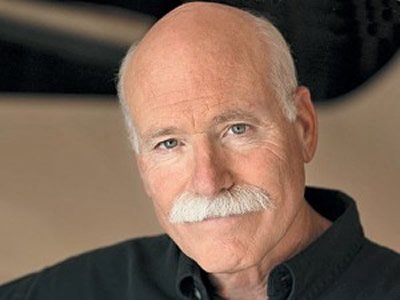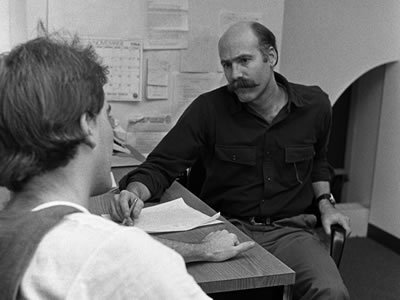Author Tobias Wolff to Receive National Medal of Arts Sept. 10
Former Syracuse professor among those recognized at White House ceremony

The National Medal of Arts is the highest award given to artists and arts patrons by the federal government.
Wolff, who taught in Syracuse’s M.F.A. Program in Creative Writing from 1980 to 1997, before joining the faculty of Stanford University, is being lauded for his contributions as an author and educator. His citation reads: “His raw works of fiction examine themes of American identity and individual morality. With wit and compassion, Mr. Wolff’s work reflects the truths of our human experience.”
The California resident has many other honors to his name, including two PEN awards (1985 and 2006) and The Story Prize (2008). He also is involved with The Big Read, an initiative of the National Endowment for the Arts (NEA) that develops community-wide reading programs around the country.
The NEA manages the National Medal of Arts nomination process on behalf of the White House.
“Every award is special to me, as a reminder that the work you perform in solitude is also a social act—that you're not just talking to yourself, that what you do can stir a response in others,” explains Wolff, during a recent email exchange. “It's easy to forget that, when you spend your hours sweating over the choice of a word, taking semicolons out and putting them back in. But of course I'm not so jaded as not to feel particular gratitude at receiving this award from the hands of our president—a man I greatly admire.”
Wolff’s Syracuse tenure briefly overlapped that of another literary icon, Raymond Carver, who died in 1988. Both men had Pacific Northwest roots, but it was Wolff’s time in Vietnam that inspired him to channel his wartime experiences into the novella The Barracks Thief (Ecco, 1984) and the memoir In Pharaoh’s Army: Memories of the Lost War (Vintage, 1995).
Other books Wolff published while at Syracuse were In the Garden of the North American Martyrs (Ecco, 1981), his first collection of short fiction, and the memoir This Boy’s Life (The Atlantic Monthly Press, 1989), which was made into a film with Leonardo DiCaprio and Robert DeNiro.
“Toby is one of a handful of writers of his generation whose work will be read as long as there is interest in the written word,” says Christopher Kennedy G’88, associate professor of English and director of the M.F.A. Program at Syracuse. “It’s impossible to picture the landscape of American fiction without him in it."
With his rich, authoritative baritone and signature moustache, Wolff also proved himself a gifted teacher and capable administrator. Among his many Syracuse students were Jay McInerney G’86, Tom Perrotta G’88, George Saunders G’88, Claire Messud G’90, and Lily King G’95. Wolff also hired Saunders and Arthur Flowers, both of whom still serve on the English faculty.

Saunders is honored to call Wolff a friend. “Toby is that very rare person: a true master of his art form (the finest living American short story writer) and a consummate teacher of writers,” he writes. “What animates both activities is a level of generosity of spirit I've rarely seen—a love for life that manifests in boundless artistic curiosity, and a selfless and seemingly unlimited concern for his students. I consider it one of the chief blessings of my life to have been able to study with him, when I was desperately looking for an artistic and personal role model.”
These sentiments are echoed by McInerney, who credits Wolff—and Carver—for teaching him a “hell of a lot about writing.” During a 2013 interview, McInerney recalled that, for all of Wolff’s and Carver’s success at Syracuse, they could not have been more different: “Ray treated his work like a living thing, and was not bound to it. He’d nurse it along. … Toby was more methodical, and viewed writing like a watch, which could be taken apart and reconstructed. He was also very objective with his teaching.”
Perrotta still marvels at the fact that he had Wolff as a teacher. That he was the antithesis of the “tormented, hard-drinking, narcissistic writer who [left] a trail of emotional chaos in his wake," Perrotta says, was revelatory.
“Not only is Toby an artist of the highest caliber, but he also taught by quiet example that it is possible to be a serious writer and a decent, well-adjusted human being with an unerring moral compass, a generous spirit, and a great sense of humor,” says Perrotta, who, as a student, was fortunate to hear Wolff read an excerpt from This Boy’s Life as a work-in-progress. “Toby embodied the idea that the same principles held for the writer and the human being—that honesty, empathy, and love were the highest values in both arenas—and that there was no inherent contradiction between greatness as a writer and goodness as a person.”
Wolff’s star has continued to rise at Stanford, where he serves as The Ward W. and Priscilla B. Woods Professor of English. Recent publications include the collection Our Story Begins (Alfred A. Knopf, 2008) and the novel Old School (Knopf, 2003). His work also appears regularly in The New Yorker, The Atlantic, Harper’s, and other major literary magazines.
Eighteen years on, Wolff reflects fondly on his time at Syracuse. “I remain grateful for my time there—for the friendships I enjoyed across the University, and the pleasure of leading workshops with some of the most gifted writers in the country—now a Who's Who of contemporary American literature,” he says.
Wolff is not the only recipient of this year’s National Medal of Arts with ties to Syracuse. Others include multimedia artist Ann Hamilton, whose exhibition table was co-presented last year by the Urban Video Project and Light Work; musician Meredith Monk, who headlined last fall’s Pulse Performing Arts Series; and theater director Ping Chong, who served as the 2010 Jeanette K. Watson Visiting Collaborator in the Humanities Center and whose oral history piece Cry for Peace: Voices from the Congo was produced by Syracuse Stage in 2012.
Jhumpa Lahiri, who is receiving the National Humanities Medal at Thursday’s ceremony, is the author of The Namesake (Houghton Mifflin Harcourt, 2003), last year’s CNY Reads One Book selection. In 2006, she and Saunders shared the stage in a Rosamond Gifford Lecture. Like Wolff, Lahiri is an NEA Big Read author.
Media Contact
Rob Enslin
